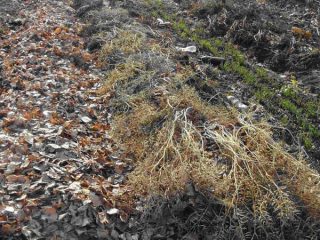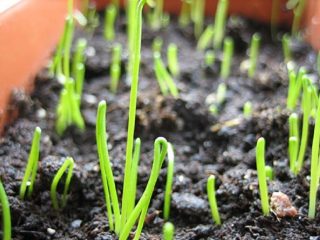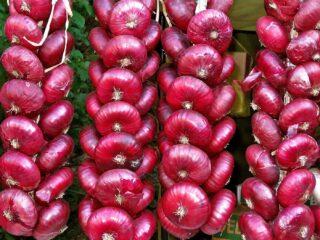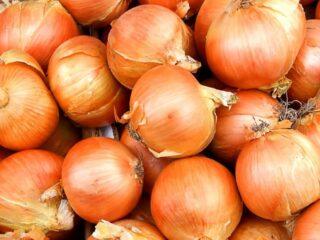Content
Onion Zolotisty Semko F1 is an early ripe, fruitful hybrid of the first generation, resistant to unfavorable germination conditions. It belongs to the universal varieties, suitable for fresh consumption. After heat treatment, it loses its sharpness, acquires a softer aftertaste.
Description and characteristics of the onion variety Golden Semko
The hybrid was bred by Russian breeders based on the Dutch Red Semko onion. It was entered into the State Register of the Russian Federation in 2000. The organizer of the variety is the Moscow agrofirm "Semko-Junior".
Onion sets Golden Semko has established itself as a versatile, unpretentious variety with a stable yield. Almost no tears when cleaning. The taste qualities of the Zolotisty Semko onion were evaluated by experts as excellent.
Appearance
The F1 hybrid grows in single large bulbs without forming nests. The fruit of the Semko variety is even, round in shape, dressed in a golden husk. The neck of the turnip is thin. The inside of the fruit is white, juicy, with a specific pungent taste.
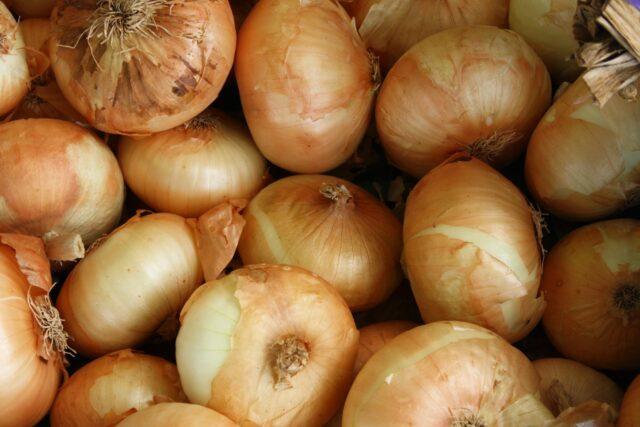
There are few scales on the bulb Golden Semko, mostly 2-3 layers
The aerial part of the plant is a bright green hollow feathers. They reach a height of 30-35 cm, weakly sharp. Up to 40 feathers are formed on one turnip.
Ripening period and yield
Onion Golden Semko F1 belongs to the early maturing type. From germination to harvesting, no more than 2.5 months pass. The weight of one bulb is 75-80 g, the yield is 1 m2 - 4-5 kg. The shelf life is 5-7 months.
Disease and pest resistance
Onion Golden Semko F1 is immune to diseases of the Onion family. But unfavorable weather conditions and non-compliance with agricultural techniques lead to the development of fungal diseases: spotting, fusarium, various types of rot, powdery mildew.
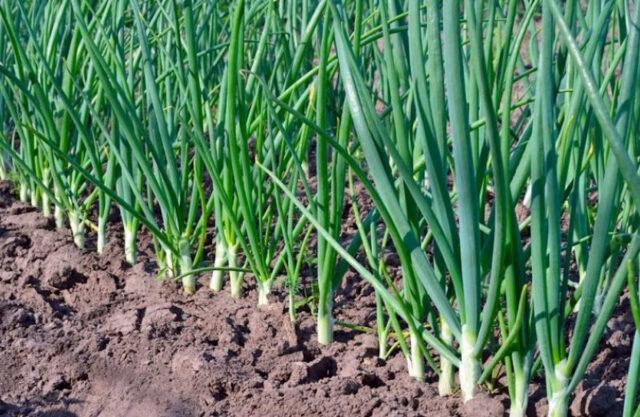
Of the pests for the Golden Semko variety, thrips, caterpillars, and onion fly are dangerous
Composition and properties
The beneficial properties of onions include:
- antibacterial effect on the intestinal microflora, improving metabolism;
- enrichment of the body with vitamins and microelements;
- optimization of the protective properties of the body, reducing the risk of developing cancerous growths;
- elimination of toxins.
Hybrid Golden Semko is rich in vitamins and minerals. The chemical composition includes: manganese - 11.5%, cobalt - 50%; silicon - 16.7%, vitamin C - 11.1%.
Application
Onion Golden Semko is used in cooking. It is included in many dishes. They are eaten raw, boiled, fried, caramelized. Golden Semko is used as a flavoring agent for meat and fish dishes, for making sauces, pies, and gravies.
In folk medicine and cosmetology, onions are used to prepare masks for skin rejuvenation and restoration, to strengthen hair.
Growing regions
Hybrid Golden Semko F1 is recommended to be cultivated as an annual crop. Cultivation is carried out in the open air. Both southern regions and regions with a temperate climate are suitable. In the northern regions, the hybrid is grown in a greenhouse. In this case, the planting must be supplemented.
Advantages and disadvantages
Before choosing a variety for planting in a particular region, you need to familiarize yourself with its characteristics, advantages and possible disadvantages. Onion Golden Semko F1 is in demand among vegetable growers, since it is unpretentious, does not need special care.
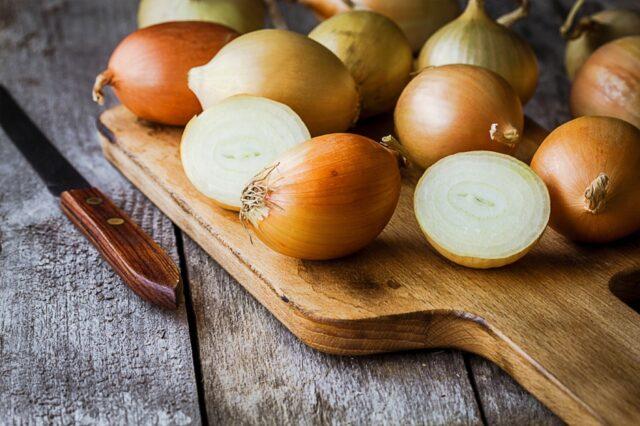
The vegetable contains many useful chemical elements, so it is used for summer salads, for frying and baking.
Pros:
- easily tolerates temperature fluctuations;
- has immunity to pests and diseases;
- shows high productivity in any climatic zone;
- unpretentious in care;
- shelf life of finished products is 5-7 months;
- two planting methods - seeds and bulbs;
- good marketability and taste.
The disadvantages include the fact that the onion Golden Semko F1 is not suitable for growing on a feather. The agrarians have learned to cope with the increase in the growing season in the northern regions. In recent years, the hybrid has been cultivated by seedlings.
Landing dates
Semko onion sets are planted in early spring or before winter. At the same time, the average daily soil temperature should not be lower than +10 ° С. If the hybrid is planted before winter, the site must be mulched with a layer of compost, and when the first frosts come, cover it with branches of coniferous trees. With the arrival of spring heat, the spruce branches are removed.
How to plant
The beds for planting the F1 hybrid are equipped in a well-lit area. In the shaded corners, the turnip turns out to be small, deformed, with arrows. The soil for onions should have a neutral pH level (you can cultivate in a slightly alkaline one). Golden Semko loves moderate humidity.
Growing from seeds
The sowing of the seed material of the hybrid is carried out in grooves with a depth of 2 cm. required sizes.
After placing the seeds in the grooves, they are sprinkled, be sure to watered. Before the first shoots appear, it is recommended to cover the planting. As soon as feathers hatch at the Golden Semko bow, the shelter is removed. Under favorable climatic conditions, wait for the first shoots in 10-14 days.
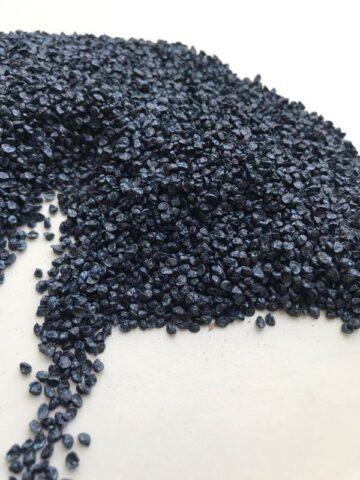
Onion cultivation Golden Semko seeds suitable for southern regions
In regions with warm climates, conditions are conducive to harvesting from seed in one season.
Planting sevka
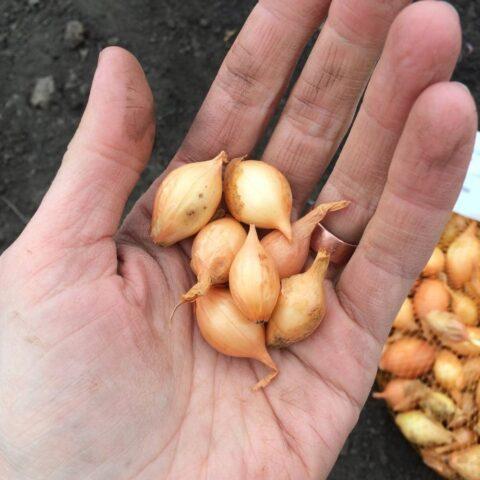
Sevka onions Golden Semko are recommended to be immersed in a solution of copper sulfate or in water for 20 minutes before planting
After pre-planting etching, the turnips should be rinsed and dried. When planting wet material, there is a high risk of rot development.
Before sowing, onions Golden Semko are calibrated by dividing into three fractions.
The recommended row spacing is 20-25 cm, the distance between the bulbs is 10 cm, the depth of the grooves is 5 cm. The turnip is sprinkled with earth so that 3-5 mm remain above the surface.
The sevok located close to the surface will also receive an incorrect configuration of the turnip. After planting, the beds are sprinkled with a layer of sand (up to 5 mm), the site is leveled.
Care features
Care for the Golden Semko onion is carried out for the first two months. The culture needs watering, loosening the soil, making additional fertilizing.
Watering
The first eight weeks from the moment of planting, the Semko F1 hybrid should be intensively irrigated. To do this, use warm water, preferably settled. Depending on climatic conditions, the frequency of watering is regulated. On average, the beds are irrigated once every seven days. In dry weather, the number of irrigations is increased, in rainy weather, it is reduced. Moistening is stopped three weeks before harvesting from the beds.
If the Golden Semko onion is cultivated in a greenhouse, irrigation is carried out by drip.An excessive amount of moisture leads to rotting of the turnip.
Weeding, loosening
During the period of active growth of Semko F1 onions, it is necessary to regularly weed the weeds. On loose, well-aerated soil, the yield is several times higher. Manipulations are carried out at least once a week, it is recommended to do this the next day after watering.
Top dressing
It is necessary to fertilize the area where Semko onions are planned to be cultivated before planting. The first time the fertilizer is applied during the autumn preparation. Secondary dressing is carried out immediately before sowing. A solution of cow manure or chicken manure is suitable, the consumption rate is 3 l / m2.
The third feeding of the hybrid is carried out two weeks after the emergence of the shoots. To do this, dissolve 30 g of urea in a bucket of water. The volume is sufficient to irrigate a 2 m² plot.
Harvesting and storage
The fact that the time has come to harvest is warned by drooping feathers, a slightly dried turnip neck. The hybrid is harvested in clear, dry weather. After removing the onion from the ground, it is spread under a canopy. Before laying the onion, the Golden Semko is allowed to dry for several weeks for storage. Then rotted and spoiled specimens are selected.
Disease and pest control
When the first signs of an illness appear, it is necessary to treat the beds with fungicidal preparations. The most effective are Previkur, Maxim, Skor.
To avoid contamination of the site, it is recommended to sort out the planting material. Rotten, untrustworthy bulbs are discarded. The fungus actively develops in acidic soils. Therefore, the soil is limestone with dolomite flour.
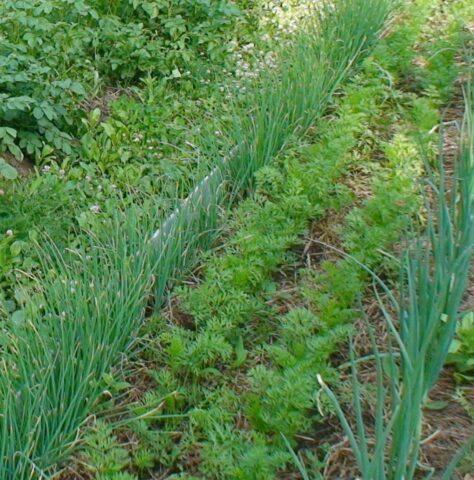
To prevent the appearance of harmful insects, onion beds should be alternated with carrot beds.
Effective remedies for pests are: treatment of seedlings and seed material with a solution of copper sulfate (1%), spraying greens with soapy water.
Conclusion
Onion Golden Semko F1 is unpretentious in care, adapts well to any climatic zone, has immunity to most diseases, it is rarely affected by harmful insects. To avoid the appearance of ailments and damage to the crop by parasites, it is necessary to carry out preventive measures in a timely manner.
Reviews of gardeners about the onion Golden Semko

